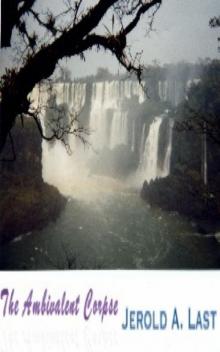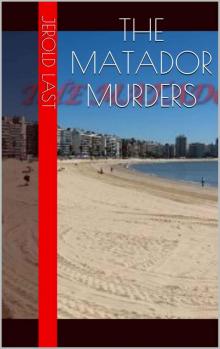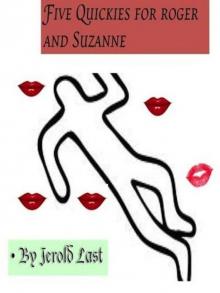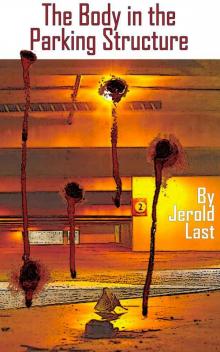- Home
- Jerold Last
The Surreal Killer (Roger and Suzanne South American Mystery Series Book 2) Page 12
The Surreal Killer (Roger and Suzanne South American Mystery Series Book 2) Read online
Page 12
Suzanne took a coke and Eduardo and I had beer. We wandered over to the appetizer table, which featured empanadas (cheese- or meat-filled stuffed pastries), Andean foods like humitas (corn tamales) and pastel de choclo (a corn casserole dish), some spicy salsa dips including the local variety called pebre, and more typically American and Spanish items liked stuffed mushrooms, Costco-style frozen puff pastries, olives, cheeses, and fresh vegetables with dips. We tried a little bit of everything, which ranged from good to delicious. The main courses turned out to be chicken, fish, and a wonderful Chilean seafood stew called curanto that contained sausage, chicken, cabbage, lots of different kinds of fresh seafood, and I don't know what else cooked all day in white wine. Vegetables, potatoes, salad, and bread rounded out the huge meal.
Over the course of the evening we ended up chatting with all of our new acquaintances from Iquique, plus a couple of the Arica biochemistry contingent, Felix Figueroa and Jaime Alarcon, who had flown down in a small plane for the party. Both were young, in their early- or mid-30s, tanned, and obviously outdoorsmen. Jaime was the taller of the two, wore eyeglasses, and seemed less comfortable in this social situation. I remembered having a nice chat with the two of them over lunch in Cuzco on the trip here and spending some time with them while we toured Machu Picchu. They reminded me a little bit of Pedro and Romero, who noticed us and walked over to join our little group in the middle of our conversation.
Felix, the one with the dimple on his chin and a ready smile, explained why they used a small plane to travel from Arica to Iquique. "The scale of distance here in the Atacama Desert is very different than anyone who lives in a more densely populated area is likely to be used to. The cities are far apart. The roads, such as they are, are not very well maintained outside of the cities, so it's hard to drive anywhere fast. The weather is almost always sunny and dry, visibility is perfect, and the air space is practically empty. It's an ideal situation for having a small plane to get around in rather than, or in addition to, a car. It's a lot like the Alaskan Bush country or the Australian Outback. The small planes can land anywhere flat so you don't need formal airports and you can come and go as you please over hundreds of miles in a short time. One can buy a used 2-seater plane at a reasonable price, especially if three or four families share the cost. Even if the plane itself is 25-30 years old, there are rigorous rules about engine maintenance and replacement of aging parts that keep the crucial parts young and safe to rely upon. So it's not unusual to see people flying from place to place, and having a pilot's license is a good way to make oneself popular. There are plenty of planes available to rent at the airports in Arica and Iquique so we have a tradition of inviting each other to big social gatherings despite the distances involved."
Jaime, whose obvious discomfort in a large party-type social setting was apparent from his almost haunted facial expression, added, "The billing for the plane we rented is by the actual hours of flight, not the total time the plane is out of the airport. So we're only paying for the fuel we use and a few hours of flying time, split two ways, and we'll fly back in a couple of days so we can be in Arica to teach our scheduled classes Monday morning. We're both bachelors and really prefer to spend our weekends in Iquique. Arica can be a pretty boring place over a weekend, while there are plenty of single women looking for fun here in Iquique from the cruise ships and as tourists. Iquique has a very swinging nightclub scene on the weekends if that's the kind of entertainment that you enjoy. Felix does all the piloting, so he does all of the work. I just have to pay for my share of the fuel and the rental fee and he does all the heavy lifting. I'm not sure of the exact words, but isn't there a saying in English about it being "the only way to fly?"
Jaime was noticeably fidgety as he talked, his hands and fingers moving constantly with drumming fingers and nervous tics. There were also other nervous mannerisms, as he constantly took his eyeglasses off and put them on again, and cleaned the glasses at least six different times during this conversation. I made a mental note to ask Vincent whether this was his normal behavior or whether he was responding specifically to us being there and talking to him.
An interesting pattern was emerging among our suspects. All of the faculty members we were meeting seemed to fall into one of two groups: Vincent’s contemporaries, aged 50 to 60-ish, and our contemporaries, aged 30 to 40-ish. There was a definite gap in between. The apparent minimum threshold at approximately 30 years of age made sense since an education to a Master’s degree was a minimum required qualification for the job and students graduated from college a year or two older in Chile than the USA. The older group was mainly leftovers from the Pinochet regime, former CIA agents, ex-police and ex-paramilitary members. The gap between was the period of transition while the universities in Iquique and Arica grew from small local colleges to their current much larger size as branches of the University of Chile.
"Speaking of flying," Romero asked, "will you being joining us tomorrow?"
"Yes, it sounds like a lot of fun," Suzanne answered for us. "What time should we be ready to go?"
"Pedro or I will pick you up promptly at 8 if that's OK with you."
"We'll be ready," she promised.
"Eduardo, the plane is a 5-seater. You're big enough to slow us down a little bit, but you're welcome to join us for the trip tomorrow if you want to," Romero added.
"No thanks," Eduardo replied with a nervous laugh, "I hate flying, especially in small planes, and I have a lot of work I have to do."
Towards the end of the evening when it was getting late, Vincent asked if we had time to touch base with him for a private chat before we had to leave. The four of us went into a room that was obviously Vincent's den. "Man cave" might be a better description, with lots of hunting gear and trophies competing for space with the ubiquitous books and papers an academic scientist accumulates.
"I wonder if I could do anything else to help you guys, and whether you've made any progress in finding out who the bastard is that you're looking for," Vincent explained.
Eduardo took the lead. "So far no progress for any of us except for tentatively eliminating some names of guppies from the list, and you've been a big help all the way. Tonight was great, and I think we're getting to know this group well enough to start ruling out most of them as suspects. I'm guessing that we'll go home from here with an unsolved mystery and no more professional interest in Arturo Prat University."
"That leaves me with just one little problem, Eduardo. I hope you can help me with it, because it's bothersome. Roger and Suzanne either have brilliantly constructed cover identities or they are pretty much exactly who they say they are. On the other hand, you come up on the CIA computers as being, how should I say it, somewhat more than just a Paraguayan policeman. So, I'll ask again, what are you doing here?"
"Exactly what I told you. I'm here only as a Paraguayan cop, actually by invitation of the Chile, Peru, and Bolivia police forces, to investigate a series of killings. I'm not here under anybody else's direction or orders. There's no hidden agenda as far as you are concerned. I give you my word on that."
"OK Eduardo, I think that's good enough for me. Thanks. But that brings us to my last question, Eduardo. You're a complex mixture of things--policeman, spy, and I don't know what else. How do you fit in with Suzanne and Roger, who seem to be perfectly normal people who should never have met you?"
"Coincidence, Vincent, pure coincidence. We met during a different murder case in Uruguay last year and became good friends. Both Suzanne and Roger are innocent civilians in the context of this discussion, but they have several unique talents that I recognize. One of those very useful talents is that Roger seems to be Sherlock Holmes' great-grandson. He has the best ability in deductive logic that I've ever seen. That trait makes it incredibly difficult to fool him, so he can zero in on the "why?" of the crime, which leads him to the "who done it" by some mental pathway that nobody else has thought of, even if it seems obvious after he's explained it. I must admit I took advantage
of our friendship when I realized that I was completely stumped on this case," Eduardo concluded.
Now it was my turn. "I still have a couple of questions for you, Vincent, if that's OK."
"Sure, what can I tell you?"
"First, Jaime Alarcon and Felix Figueroa are here from Arica and we had a little chat. Jaime was incredibly nervous. Is that typical of him?"
"In a small group, no. He's just fine one on one or when he's with Felix. They go girl hunting together at the local bars and both seem to do very well. However, in a large party like this one he becomes incredibly shy and nervous. He has trouble giving large lecture classes at the university, too. He's great in the small classroom. None of us understand it, but that's just the way he is."
"My second question is about another interesting pattern that I think I see emerging here. Is being a pilot a marker for who the CIA agents and the younger trainees are? Do you, Rogelio, and Eugenio fly? Are Pedro, Romero, and Felix your new trainees? This case would make perfect sense to me if who is who was as simple as that."
"You do have some impressive deductive skills, Roger," replied Vincent. "You are completely correct."
I blushed becomingly and we said goodnight to Vincent and took our leave from the party.
A while later, Suzanne and I were headed for bed.
"Roger, you told Eduardo and Vincent that you were beginning to have a theory. I know you well enough to know that translates to you already think you know who did it, but the lawyer in you also knows that you can't prove it beyond a reasonable doubt in a court of law yet. What can you tell me now?"
"How about this much, just to see if you can deduce a bit more than I can? I can get it down to six possibilities with about 99% certainty, and down to five possibilities with about 98% confidence. I can get that down to three possibilities with about 90-95% confidence. After that it's still a coin flip time for me, but I have a hunch I know which one of the three it is based on a couple of things. We're going to either need to figure out which of the three we can rule out, or else we need to sucker the bad guy into revealing himself by encouraging him to make some kind of move.
"One of the hardest parts for me to figure out is whether our killer acted alone or had help. That's what I mean by ruling guys out. For example, let's take Vincent as a test case. We both like him a lot and he's given us all the help that's taken us this far, so we think he's innocent. But on the other side of the ledger are a couple of potentially incriminating things. He took me straight to the nearest bar from the crime scene in Lima when it was pitch dark in the middle of the night. He'd obviously been there before. And all that likeability is exactly what I'd expect from a sociopath who didn't have normal feelings of guilt and impulse control. How do we know that the Vincent we see is the real Vincent? And I still think he's been playing us with all that help. He has his own agenda, which includes pointing us in very specific directions at times and deliberately misdirecting us at other times, that I'm not sure I understand completely yet.
"Suzanne, I've thought enough about serial killers for one day. Let's relax. In honor of all the stuff we heard today about planes, pilots, and flying, I've got a special pun for you."
"Did you hear the one about the two NATO Air Force pilots, one French and the other British, stationed near Libya who take a break from the fighting and fly down to the Serengeti Plains to go on a safari to hunt lions?"
"No, Roger, I never heard that one. But I'm sure you'll tell me all about it."
“The two pilots make a bet so that whoever shoots the first lion, the other guy has to buy the first round of beer. The first pilot, the Frenchman, goes off on safari with his rifle, and gets a clean kill on the evening of the second day out. The second guy, the Englishman, decides that one way or the other he’s going to win this bet. He gets into his F-102 on the first day, flies around the savannah at low altitude with all the infra-red spotting equipment on for a while, spots a lion, and strafes the heck out of it. He radios down to his safari truck and they collect whatever remains of the lion. That means he wins the bet and the Frenchman has to buy the beer. Do you know what this proves?”
"No, Roger. What does it prove?"
"Why this proves that the shortest distance between two pints is a strafed lion, of course."
Chapter 17. Those Psychology Classes Were Good Things to Study
The Surreal Killer woke up feeling pleased with how things were going. So far, there was no sign of Eduardo checking up on him, and Eduardo was the one to look out for. Roger and Suzanne had interacted with him socially without any indication of anything other than a collegial relationship, which he doubted anyone, especially a woman, could fake if they were suspicious of him. So Eduardo obviously hadn't told them anything about serial killings or any of the murders. All of the meticulous planning and attention to detail had kept him safe so far and it would keep him safe now.
He felt good after each killing and looked forward to doing it again every time. But this next one would be special. It would be the first time he killed someone he knew, and it was someone he really wanted to murder. Maybe he would let it take a lot longer this time. He imagined seeing Suzanne lying there helpless after he had injected the paralytic drug into her jugular vein. The drug was long acting. Maybe this was a good time to do an experiment to see how long the effect would last before she could move her fingers or blink her eyes. She would feel some of the pain when he used the machete. Wouldn't that be interesting?
"It was ironic," he thought. If the first trainee hadn't messed up writing the word "drogas" during his test killing, then he'd never have been required to sign his killing "no mas". He had a great deal of self-understanding thanks to all of those psychology classes he had taken in college. All of that psych theory told him that those two words were almost certainly the trigger that started him killing his mother, at least symbolically, over and over again. Yes, indeed, it made him feel good.
Chapter 18. Flying Over the Atacama Desert
Pedro picked us up right on time and drove us to the airport. Unlike pretty much everywhere else in South America, people were usually punctual in Chile. It was one of several things that made me feel more at home here than I had in Salta or Montevideo. Another was that everybody we met spoke English, so my limited skills in Spanish were not being tested. Pedro made small talk about the plane we'd be flying in today while we drove to the airport.
"There’s plenty of room for all of us in our plane, a Beechcraft Baron. It has a range of about 3000 Km (almost 2,000 miles) and a cruising speed of 367 Km/hour (230 mph). It’s about 356 Km (221 air miles) from Iquique to Antofagasta, so we’ll be there and back in about 3 hours, and use less than 15% of a tank of fuel in the process so we have a huge, how do you say it, margen de la seguridad' in English?"
Suzanne replied, "Margin of error."
"Thank you. This plane belongs to Arturo Prat University, which bought it used about 5-10 years ago," Pedro continued. "The university paid three of us, Romero, myself, and Felix Figueroa from Arica, to serve two years in the Chilean Air Force and to get our civilian pilot's licenses to fly multi-engine planes like this one after we graduated and before we started our faculty positions. There’s a lot of field research being done in biology, zoology, botany, agriculture, and ecology using this plane, and all three of us who can fly it collaborate in all of those studies. Felix spends several days a month here in Iquique piloting this plane, so none of us feels like we're having to do too much flying to find time to teach or have a life away from the university.
"The researchers involved have, how do you say it, 'juntado'?"
"Pooled," replied Suzanne.
Pedro followed his previous train of thought. "They've pooled grant funds and government teaching money to buy some pretty sophisticated equipment they've installed that you'll get to see in action later. Our engineering students also learn how to overhaul and maintain airplane engines, including this one, in a special elective class if they choose to take it. Several of
our graduates make very nice careers out of aircraft design and maintenance, and we get a plane that's kept in excellent shape maintenance wise in the process."
We took off to the south into a deep blue sky in bright sunshine exactly on time, the Pacific Ocean on our right. There were no control towers or air traffic control systems regulating general aviation here in the isolated Atacama Desert. You looked all around to make sure the local airspace was clear, and off you went. Romero had filed a flight plan on an air traffic control computer in Antofagasta via the Internet in case the plane went down somewhere so that people would know where to look for us. That was the only formality required here. Romero flew the plane with me next to him in the shotgun seat. Pedro and Suzanne sat behind us. Romero and I wore headphones that allowed us to hear each other over the engine noise during the takeoff. When we reached our cruising altitude of 21,000 feet and leveled off Romero adjusted the trim and cut back on the power, which lowered the decibel level so we could dispense with the headphones and talk to each other at normal volume.
"Have you ever flown a plane, Roger?" asked Romero.
"No, I haven't," I replied.

 The Deadly Dog Show (Roger and Suzanne South American Mystery Series Book 6)
The Deadly Dog Show (Roger and Suzanne South American Mystery Series Book 6) The Surreal Killer (Roger and Suzanne South American Mystery Series Book 2)
The Surreal Killer (Roger and Suzanne South American Mystery Series Book 2) The Body in the Bed (Roger and Suzanne South American Mystery Series Book 5)
The Body in the Bed (Roger and Suzanne South American Mystery Series Book 5) The Ambivalent Corpse (Roger and Suzanne South American Mystery Series Book 1)
The Ambivalent Corpse (Roger and Suzanne South American Mystery Series Book 1) Unbearably Deadly (Roger and Suzanne South American Mystery Series Book 9)
Unbearably Deadly (Roger and Suzanne South American Mystery Series Book 9) The Origin Of Murder (Roger and Suzanne South American Mystery Series Book 8)
The Origin Of Murder (Roger and Suzanne South American Mystery Series Book 8) The Matador Murders (Roger and Suzanne South American Mystery Series Book 4)
The Matador Murders (Roger and Suzanne South American Mystery Series Book 4) Five Quickies For Roger And Suzanne (Roger and Suzanne South American Mystery Series Book 7)
Five Quickies For Roger And Suzanne (Roger and Suzanne South American Mystery Series Book 7) The Body in the Parking Structure (Roger and Suzanne South American Mystery Series Book 4)
The Body in the Parking Structure (Roger and Suzanne South American Mystery Series Book 4)